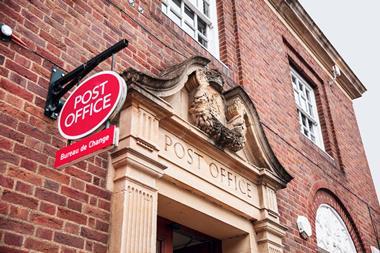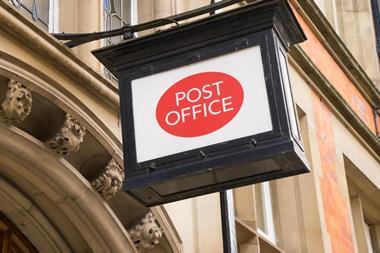Rural shops would be at less risk of shutting if they diversified into more services and opened for longer writes Helen Gregory
Images of dusty cans of peas and faded parish posters are sadly redolent of village stores. For many, this outdated image was the reality which led to their demise after years of neglect by their part-time owners and a community keener to visit the nearby superstore.
Village stores have taken a hammering over the last few years. There's no definitive figure, but the government reckons 300 close every year, with about a third of all villages now having no shop.
The Rural Shops Alliance believes there are 12,000 rural shops left while the Federation of Sub-postmasters says there are only 10,000 rural sub-post offices many having closed along with the village store.
More people commuting to work and a generation of traditional, family shopkeepers dying out have led shoppers to shun this once-integral focus of rural life. And even when a new shopkeeper takes over from a retiring incumbent, they can be derided by locals as lapsed townies looking for an easy job. Lack of expertise, short opening hours and few services frequently lead to the shutters finally going down.
Once a store closes, however, the belated realisation is that older people lose an important point of contact, local producers lose an important outlet, and the soul of the village disappears. The government appears keen to do its bit and the recently published White Paper Our Countryside: The Future, A Fair Deal for Rural England includes a £15m Community Service Fund to help safeguard or re-establish shops. As part of its Vital Villages initiative, the government plans to give out hundreds of grants, ranging from £100 to £25,000, to local communities for the provision of facilities such as cash machines or cashback services, parish meeting rooms, or technology access points such as internet kiosks.
Shopkeepers will have to take advice paid for by the scheme and will also need a business plan to get their hands on any cash help.
Alongside this, a new £5m Parish Plan Fund promises during the next three years to help 1,000 rural communities prepare their own town or village plan, giving them a say in how their neighbourhood is run. Administered by the Countryside Agency, the local plans will identify not only how best to develop but also how to safeguard vital local services such as shops.
Environment minister Michael Meacher insists: "We want to support the retention of shops in small settlements, offering a wider range of products and services and combining them with post offices, garages, pubs and other facilities.
"We aim not only to retain the rural post office network but to extend both its range of business activities and the other services it offers."
The government believes village enterprises need to change their mindset by offering more to consumers and sharing facilities. It wants to see them offering a wide range of products and services, using new technology and good business skills.
One pilot scheme, due to be set up this year, will even offer banking, one-stop internet access, pensions, benefits, prescriptions and health advice as well as normal post office business, all under one roof.
Some parts of the industry say the funds don't go far enough, however, and accuse the government of electioneering, but the Federation of Sub-postmasters is counting on the government to help improve the lot of post offices, which are often intrinsically linked with stores, to make sure they are used as well as or even instead of banks.
General secretary Colin Baker admits this will need a multimillion pound investment, otherwise, he reckons, another 5,000 post offices will close very quickly and village stores along with them. "The decline will continue if we don't do something." Sub-post offices close in the UK each week, many of them along with a shop.
He says bluntly that you can blame everyone for the situation. "Supermarkets have vacuumed out villages and villagers have turned their villages into dormitory towns by working away. You can blame the government for lack of investment, the sub-postmasters for not giving customers what they want and us for not advising them in the right way."
The federation is now working with the government to reinvent post offices and turn postmasters into what he terms "general practitioners". Baker's vision is to train them so they can give out information on benefits and local services, and are internet literate. "We want to reinvent the sub-postmaster and make the job more viable. We want to arrest the rate of closure."
It also plans to relaunch its buying group next month so that sub-postmasters can get hold of groceries. Its tie up with the Post Office Network and Palmer & Harvey McLane aims to allow post offices to compete with the multiples. The Counters Club lets sub-postmasters join the group for 50p a week, which gives them deliveries to their door and access to the wholesalers' business development advisors.
Bureaucracy can also be a killer for small traders, reckoned by the Rural Shops Alliance to take up about 24 working hours a month on tax, national insurance and wages.
It is urging the government to cut down on the amount of paper work which local shops have to cope with. Manager Sean Carter believes it is one of the factors which has contributed to the sector's dramatic decline in recent years.
Some shops have closed through lack of community support. Other family concerns have failed to move with the times and been run into the ground.
Carter says the growth of the multiple has also led to many stores' downfall. He cites examples where buses to take people to out-of-town superstores have stopped to pick up passengers outside the village store. And he says the results can be catastrophic for village life. "If a village doesn't have a shop it brings down the price of property and means they don't have a meeting place for the community. It can become a dormitory village."
But Carter believes there is still hope for rural shops, but they need to be more professional and offer a personal service to woo shoppers. Reduced price differentials and consumers' desire for individual customer care should go some way to achieving this.
"A lot of rural retailers are making a decent fist of it now they just need to find their niche," he says.
Many villagers don't realise there's a problem until the shop shuts, but others are shocked into action, setting up action groups aimed at restoring the shop.
ViRSA (Village Retail Services Association) works with local communities to claim back village stores in trouble and help open new ones by clubbing together and buying a share in the store. The groups are non-profit making and all profits are ploughed back into the store. So far, about 50 stores have been saved or set up. The process can take between six months and three years because problems in acquiring the freehold are common, and the shop can end up opening in a temporary cabin or an outbarn.ViRSA director Peter Jones says shops with a post office have been closing at a rate of at least one a day for the last year and that standalone shops have probably been closing at the same rate.
As well as poor community support, a lack of investment by the owner or tenant or a lack of services, such as the national lottery are often cited as reasons for closure. Not to mention the attitude taken by some shopkeepers that their store is a retirement job or past-time rather than a service to the community.
Jones describes this view as a "canker". "A store needs to be seen as more of a vocation. The shopkeeper needs to be committed and study what the local community wants."
He is blunt about the pitfalls. "A rural shop is a viable entity but it will take a very dedicated person or couple to make a living. They need to be entrepreneurial it's not an easy option. They'll often need to open at 6am and stay open until 9pm at night to service all the community.
"You need to be someone who wants to be a pivotal link in the community and then you'll get an enormous amount of satisfaction out of it."
ViRSA believes IT will have a huge influence on the future of the shops and that shopkeepers will have to start looking at aspects such as home shopping to keep businesses viable. For the future, Jones envisages a community hub where a village hall will host a shop, post office, cafe, and internet access.
One of the new breed of shopkeeper is Alan Fisher, chairman of the Surrey Village Shops Association, who says people like him can bring youth and enthusiasm to an operation. He believes good service is no longer enough to get villagers into their local stores. "Supermarkets are improving their service so village shops need to offer local products by getting exclusive links with producers. They then get themselves a particular branding."
Fisher's shop in Peaslake near Dorking offers internet access and tea and coffee along with the usual groceries.
"Local shops developed because of a need, whereas supermarkets targeted areas in which to open. I think the position of village shops will stabilise and people will start ordering more from supermarkets over the internet and do more of their top-up shopping in local stores again."
The multiples are often painted as the baddies in the picture, but both Somerfield and Sainsbury have made moves to illustrate their caring side. However, shopkeepers don't appear to have been racing to sign up. Sainsbury's SAVE scheme Sainsbury's Assisted Village Enterprises was launched in a blaze of publicity almost three years ago, but attracted no more than 200 retailers.
It lets shopkeepers buy branded Sainsbury's products and re-sell them in their own stores. It provides marketing and merchandising experience (posters) and also gives out extra Reward points.
Meanwhile, Somerfield's Village Link, set up last year as a trial, allows shopkeepers to buy branded and own label products at just below the retail price. Two local stores in Ickford, Buckinghamshire and Appleton, Oxfordshire get groceries delivered but the chain is still considering whether to roll it out. A spokesman says: "We decided to make use of our home delivery vans when they weren't busy, allowing us to display Somerfield produce in other locations and therefore increase our sales."
Both villagers and shops have a job to do to keep the rural heart beating. Just popping in for an occasional pint of milk on the way home from work just isn't going to keep these small businesses viable. A whole new service mindset is also needed with new and relevant services laundry, tool repairs, cheque cashing and car hire, for example.
Provide cups of coffee, an internet link and a couple of chairs and hey presto you've gone from fusty store to cybercafé.
Sales beyond expectations
The Old Smithy village store in Litton, north Derbyshire, went bust four years ago after the owners reduced services and opening hours. Now, the shop turns over £44,000 a year and just about breaks even, with any profits ploughed back into the business.
Manned by 18 volunteers and two part-time paid counter staff, it has groceries, confectionery, papers and a post office all at low margins because the payroll is so small.
Villagers banded together and managed to raise £10,000 through coffee mornings and charity walks to add to the £40,000 grant from the Development Agency to buy and refurbish the old smithy.
Group chairman Brian Molteno says coffee mornings for elderly people, information about village events and chairs for customers to sit on while they have a tea or coffee all help to keep the store busy.
"It has attracted business over and above our expectations.
"People buy a substantial amount of groceries here not just the odd tin of peas but we can only keep our prices competitive because we are so totally dependent on the villagers," he says.
Website: ukvillages.co.uk
Villages are being offered an on-line lifeline in the shape of a new web site called ukvillages.co.uk which aims to link up small communities.
More than 6,300 communities have signed up in 12 counties, including Bedfordshire, Essex, Herefordshire, Northamptonshire and Surrey, and each of them gets a home page run by a resident, featuring a notice board, village diary and for-sale listings.
It is free to users, with revenue coming from advertising by local businesses.
{{FEAT. COVER }}
Close menu
- Home
- Retail & Wholesale
-
Products & Suppliers
- Back to parent navigation item
- Products & Suppliers
-
Product Categories:
- Back to parent navigation item
- Product Categories:
- Alcoholic drinks
- Bakery
- Cereals & breakfast
- Cheese
- Chicken & poultry
- Chocolate
- Confectionery
- Crisps, nuts & snacks
- Dairy
- Fish
- Fresh produce
- Frozen
- Household
- Meat
- Own Label
- Sauces & condiments
- Seasonal
- Soft drinks
- Vaping
- Vegan & plant-based
- World foods
- Suppliers
- People
- Reports & Data
-
Topics A-Z
- Back to parent navigation item
- Topics A-Z
-
Popular topics:
- Back to parent navigation item
- Popular topics:
- Cost of living crisis
- Crime
- Deposit Return Schemes
- Finance
- Government & Regulation
- Health
- Inflation
- Loyalty
- Marketing
- Mergers & Acquisitions
- New Product Development
- Sourcing
- Supply chain
- Sustainability & environment
- Technology
- Ultra Processed Foods
- Vaping
- A-Z all topics
- Content by type:
- Events
- Ask iA (beta)
- Subscribe now
Sign in to comment on this article
Not logged in before? Register for FREE guest access today.
You will be able to:
- Read more stories
- Receive daily newsletters
- Comment on stories
Advert

















No comments yet